Striking the balance between working and developing the family farm, advancing an off-farm career as well as keeping up a social life is a common challenge among farmers in Ireland today. Michael Kenny from Leamore, Tullamore, Co Offaly is successfully doing just that on his 100ac suckler and beef farm.
He won the Macra Na Feirme Young Beef Farmer of the Year in 2016, a very impressive accomplishment. He is now in a registered farm partnership with his parents and also works as a full-time manager with Midland Veterinary in Portarlington, Co Laois.
When Michael was 12 years old his father John Joe was diagnosed with Parkinson’s disease. The diagnosis meant Michael would have to engage more in the day-to-day management of the farm. This transfer of responsibility was gradual but it allowed him to play a greater role in decision-making and strategic thinking. These traits learned at a young age are a great asset for life both inside and outside of farming.
System
The Kennys own 105ac with 85ac described as good-quality, dry land and the rest made up of bogland. They keep 20 spring-calving suckler cows and buy in weanlings. They bring approximately 40 head of cattle to beef per annum and another 40 sold through the mart. They also have some land in tillage. In the past they sold the weanlings as stores but now they are trialling finishing more stock born and bought-in on farm. Purchasing more drystock will be the main method used to increase output rather than increasing cow numbers.
“I’m focused on keeping the system simple but I still don’t want to take a backward step, labour is scarce so I have to make things as easy as possible,” he explained. When a big job is taking place on the farm such as dosing or dehorning Michael usually organises help from a neighbouring farmer. “I am working 14 to 15 hours per week on the farm on average and I want to keep it that way” he said.
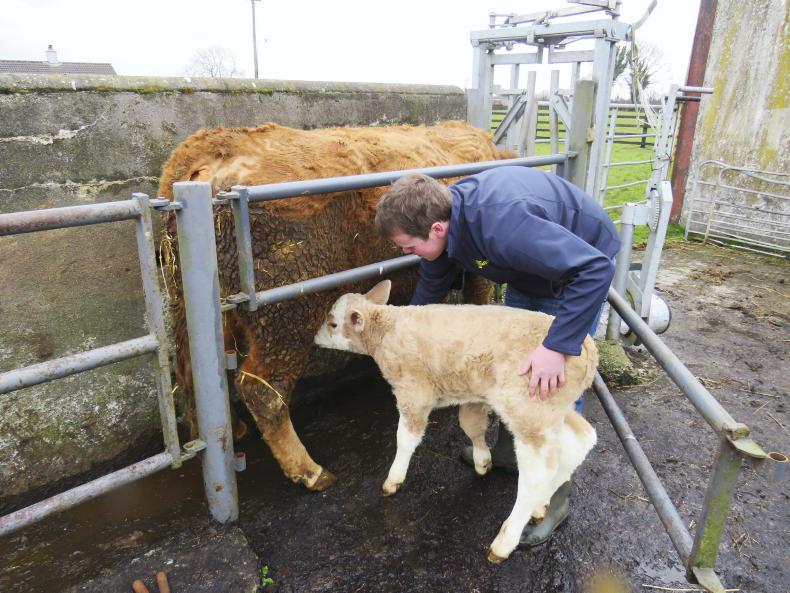
Michael farms 100ac (85ac adjusted) in partnership with his parents John Joe and Josephine. He keeps 20 suckler cows and their followers and buys in drystock throughout the year and sold through the factory or mart. The cows are all spring-calving.
Farm infrastructure
In college Michael got the opportunity to partake in work experience on Kevin Heavins dairy farm in Offaly. He said this experience opened his eyes to good grassland management and the benefits of a paddock system. Over the past number of years he has been reseeding and splitting fields into smaller, easily managed paddocks and has set up a rotational grazing system. “It’s much easier to manage grass now and if paddocks get too strong we just cut them for silage,” explained Michael. He said the paddock system and reseeding strategy allowed numbers at grass to increase.
There have been improvements made in the housing infrastructure too. Two new slatted tanks have been installed in an existing large loose shed. This has reduced the dependence on bought-in bedding and allowed numbers to increase on the farm with greater slurry storage capacity. Michael plans on building a new three-bay double-sided shed as well as a new covered handling unit and silage slab with the help of the TAMS II grant. A new handling unit adjacent to this shed will be essential for Michael to be able to handle livestock on his own. At the moment he has an old cattle crush with a headscoop.
Schemes
Like most beef farms, involvement in Department of Agriculture schemes are an important part of the Kenny’s income. Participation in the young farmer scheme allowed Michael to get a top up of 25% on the family’s basic payment and he also applied successfully to the national reserve for an increase in their entitlements because historically they had low value entitlements.
They joined the green, low-carbon, agri-environment scheme (GLAS) in 2016 which was a boost of almost €5,000 to their income. The Kennys partake in the knowledge transfer programme. There are a number of actions they must complete annually to fulfil the requirements of the programme including:
Drawing up an e-profit monitor. Setting out a breeding and animal health plan. A grassland management plan. Completing a farm health and safety statement as well as attendance in a discussion group. They are also in the Beef Data and Genomics Programme (BDGP). This involves recording calving details, genotyping animals specified by the ICBF, using a bull with an index of 4 or 5 star on the replacement or terminal index, bringing in high-star rated genotyped replacements and completing and updating a carbon navigator annually.
Plans for the future
Michael is very focused on what he wants to achieve in the next five years. Expanding the beef finishing enterprise to 150 head per annum is the target for the farm. This will also involve continuing down the road of efficiency with good infrastructure across the farm and more tillage land converted over to pasture. The greater number of cattle on farm could take up more time especially during the winter but Michael is preparing for this eventuality. “I wouldn’t rule out employing someone for one hour per day in winter to feed cattle silage/meal if needs be in the future. I just want to make work streamlined so it doesn’t affect my career ambitions,” he explained.
Education and work timeline
2011: Leaving Certificate.
2013: Level 5
degree in Gurteen
Agricultural College.
2014: Level 7 degree in Agricultural from Waterford Institute of Technology.
2016: Level 8 degree in land management from Waterford Institute of Technology.
2016: Started work in Grennan's beef and tillage farm. Winner of the young beef farmer of the year award.
2016/17: Worked in Grennan's agri retail store. Joined the young beef farmer sustainability programme.
2017 to present: Agri retail manager in Midland
Veterinary Portarlington Ltd.
Striking the balance between working and developing the family farm, advancing an off-farm career as well as keeping up a social life is a common challenge among farmers in Ireland today. Michael Kenny from Leamore, Tullamore, Co Offaly is successfully doing just that on his 100ac suckler and beef farm.
He won the Macra Na Feirme Young Beef Farmer of the Year in 2016, a very impressive accomplishment. He is now in a registered farm partnership with his parents and also works as a full-time manager with Midland Veterinary in Portarlington, Co Laois.
When Michael was 12 years old his father John Joe was diagnosed with Parkinson’s disease. The diagnosis meant Michael would have to engage more in the day-to-day management of the farm. This transfer of responsibility was gradual but it allowed him to play a greater role in decision-making and strategic thinking. These traits learned at a young age are a great asset for life both inside and outside of farming.
System
The Kennys own 105ac with 85ac described as good-quality, dry land and the rest made up of bogland. They keep 20 spring-calving suckler cows and buy in weanlings. They bring approximately 40 head of cattle to beef per annum and another 40 sold through the mart. They also have some land in tillage. In the past they sold the weanlings as stores but now they are trialling finishing more stock born and bought-in on farm. Purchasing more drystock will be the main method used to increase output rather than increasing cow numbers.
“I’m focused on keeping the system simple but I still don’t want to take a backward step, labour is scarce so I have to make things as easy as possible,” he explained. When a big job is taking place on the farm such as dosing or dehorning Michael usually organises help from a neighbouring farmer. “I am working 14 to 15 hours per week on the farm on average and I want to keep it that way” he said.

Michael farms 100ac (85ac adjusted) in partnership with his parents John Joe and Josephine. He keeps 20 suckler cows and their followers and buys in drystock throughout the year and sold through the factory or mart. The cows are all spring-calving.
Farm infrastructure
In college Michael got the opportunity to partake in work experience on Kevin Heavins dairy farm in Offaly. He said this experience opened his eyes to good grassland management and the benefits of a paddock system. Over the past number of years he has been reseeding and splitting fields into smaller, easily managed paddocks and has set up a rotational grazing system. “It’s much easier to manage grass now and if paddocks get too strong we just cut them for silage,” explained Michael. He said the paddock system and reseeding strategy allowed numbers at grass to increase.
There have been improvements made in the housing infrastructure too. Two new slatted tanks have been installed in an existing large loose shed. This has reduced the dependence on bought-in bedding and allowed numbers to increase on the farm with greater slurry storage capacity. Michael plans on building a new three-bay double-sided shed as well as a new covered handling unit and silage slab with the help of the TAMS II grant. A new handling unit adjacent to this shed will be essential for Michael to be able to handle livestock on his own. At the moment he has an old cattle crush with a headscoop.
Schemes
Like most beef farms, involvement in Department of Agriculture schemes are an important part of the Kenny’s income. Participation in the young farmer scheme allowed Michael to get a top up of 25% on the family’s basic payment and he also applied successfully to the national reserve for an increase in their entitlements because historically they had low value entitlements.
They joined the green, low-carbon, agri-environment scheme (GLAS) in 2016 which was a boost of almost €5,000 to their income. The Kennys partake in the knowledge transfer programme. There are a number of actions they must complete annually to fulfil the requirements of the programme including:
Drawing up an e-profit monitor. Setting out a breeding and animal health plan. A grassland management plan. Completing a farm health and safety statement as well as attendance in a discussion group. They are also in the Beef Data and Genomics Programme (BDGP). This involves recording calving details, genotyping animals specified by the ICBF, using a bull with an index of 4 or 5 star on the replacement or terminal index, bringing in high-star rated genotyped replacements and completing and updating a carbon navigator annually.
Plans for the future
Michael is very focused on what he wants to achieve in the next five years. Expanding the beef finishing enterprise to 150 head per annum is the target for the farm. This will also involve continuing down the road of efficiency with good infrastructure across the farm and more tillage land converted over to pasture. The greater number of cattle on farm could take up more time especially during the winter but Michael is preparing for this eventuality. “I wouldn’t rule out employing someone for one hour per day in winter to feed cattle silage/meal if needs be in the future. I just want to make work streamlined so it doesn’t affect my career ambitions,” he explained.
Education and work timeline
2011: Leaving Certificate.
2013: Level 5
degree in Gurteen
Agricultural College.
2014: Level 7 degree in Agricultural from Waterford Institute of Technology.
2016: Level 8 degree in land management from Waterford Institute of Technology.
2016: Started work in Grennan's beef and tillage farm. Winner of the young beef farmer of the year award.
2016/17: Worked in Grennan's agri retail store. Joined the young beef farmer sustainability programme.
2017 to present: Agri retail manager in Midland
Veterinary Portarlington Ltd.







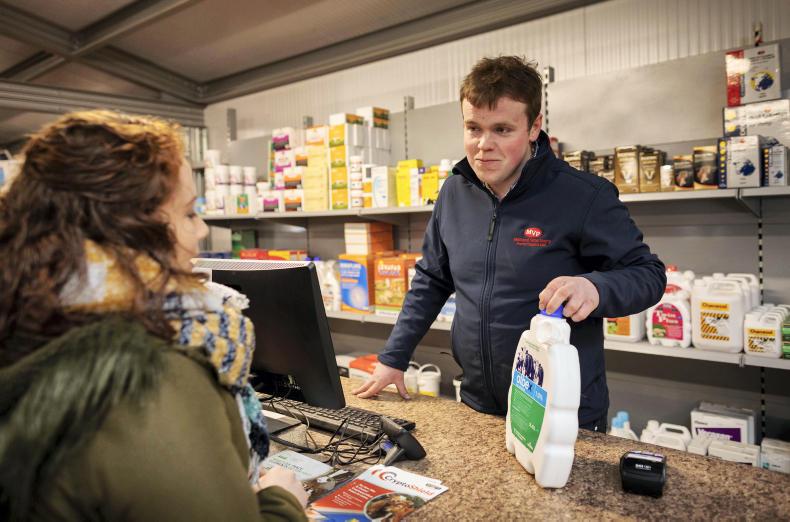
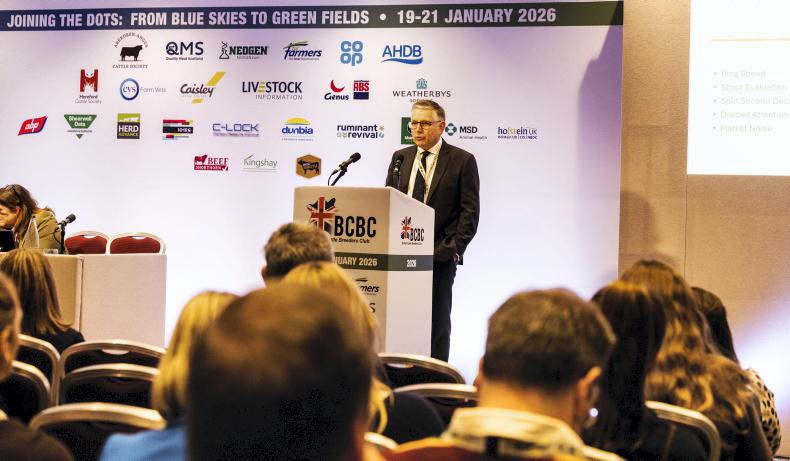

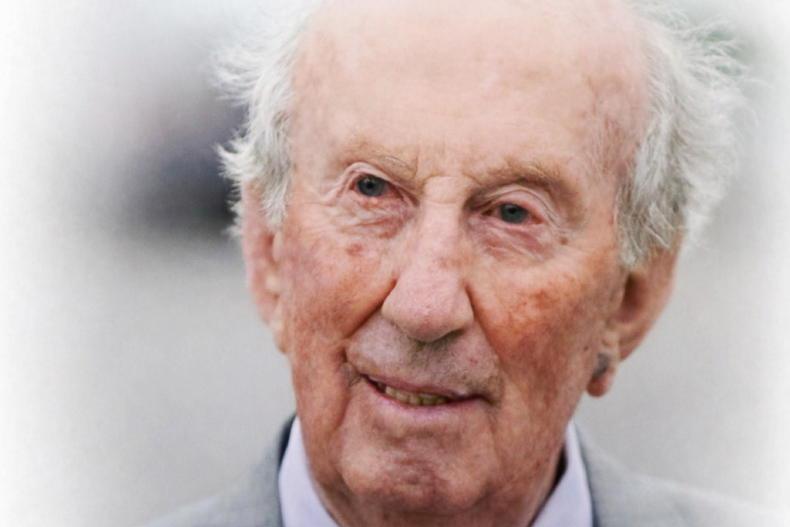
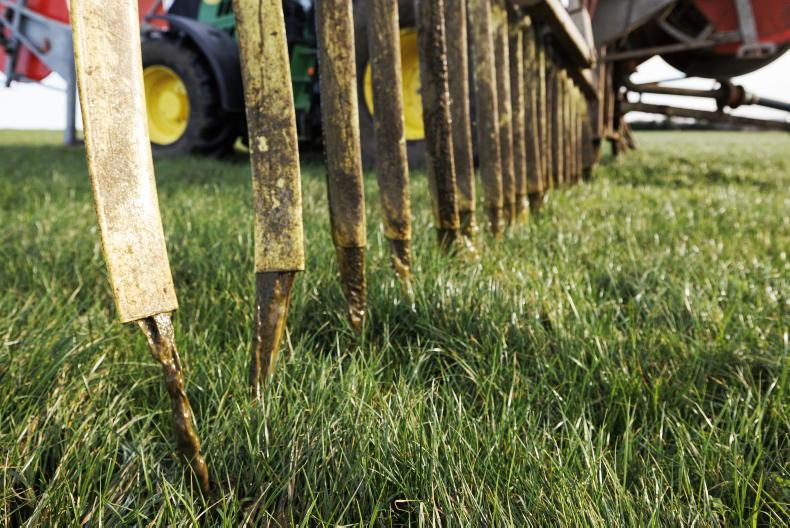
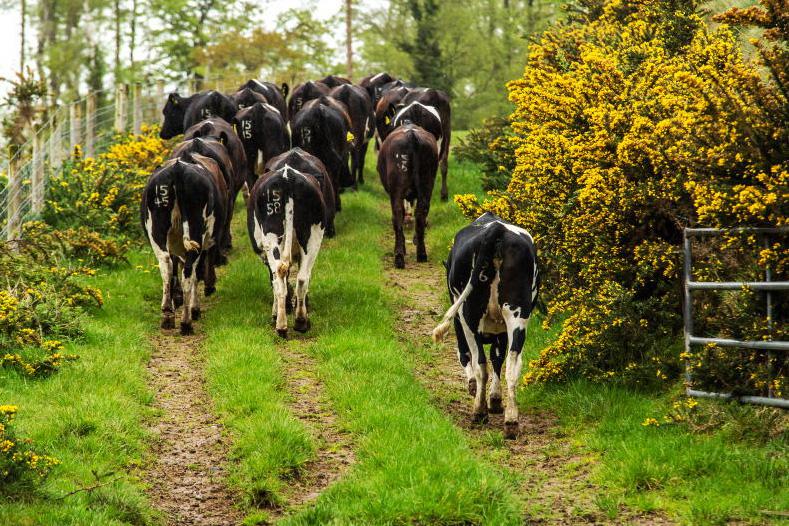
SHARING OPTIONS